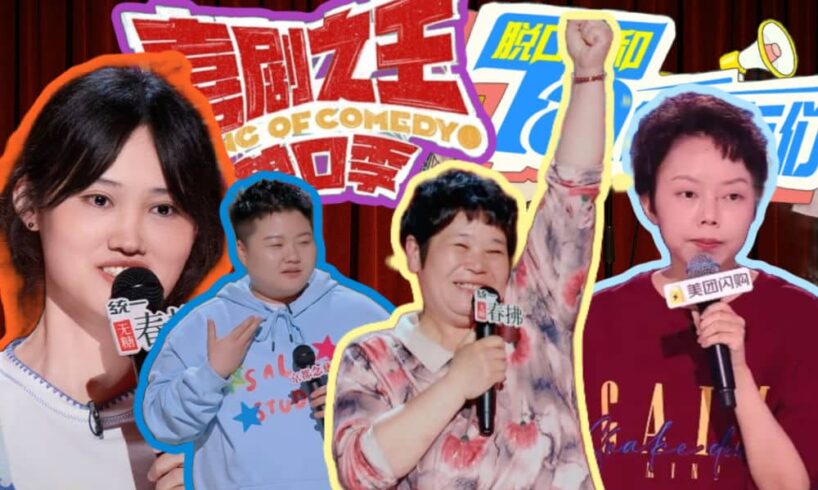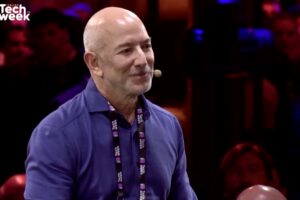
Nearly 40% of the lineup on China’s latest hit stand-up comedy shows is female. From ‘Director Fang’ to Wang Yue, this wave of new voices is not just funny—it’s reshaping China’s comedy scene and opening conversations once considered off-limits.
The summer of 2025 has once again put Chinese stand-up comedy in the spotlight. The second season of both iQiyi’s The King of Stand-up Comedy (喜剧之王单口季) and Tencent Video’s Stand-up Comedy and Friends (脱口秀和Ta的朋友们) sparked multiple trending topics across social media—not just for the jokes, but for who’s telling them.
This year, women account for nearly 40% of the combined lineups: 42 out of 107 comedians across both shows.
Just a decade ago, when Tonight 80s Talk Show (今晚80后脱口秀) dominated the field, there was often only one woman—Siwen (思文)—on stage. Even last year, women only made up 24% of The King of Stand-up Comedy’s debut lineup and 27% of Stand-up Comedy and Friends’.
With more women performing, audiences are hearing more stories rooted in lived experiences, touching on relationships, workplace dynamics, and everyday challenges faced by women.
The Rise of New Female Voices
One of the most talked-about breakouts is 50-year-old Fang Zhuren (房主任, literally “Director Fang”).
Her entry into the stand-up comedy world came by chance during an audience interaction. During a performance by Li Bo (李波), a talk show actress, Fang was randomly selected for an interaction with Li. Her nickname “Director Fang” stems from her spontaneous response, as she humorously introduced herself as the “director of the village information center (or the village gossip hub).”
This interaction impressed Li and eventually led her to a contract signing with Li’s talk show* club. Weibo netizens summarized this story with the label of “girls help girls” (#房主任李波girls help girls#).
[*This use of ‘talk show’ refers to the Chinese tuokou xiu 脱口秀, which usually does not refer to a Western-style talk show but (live) stand-up comedy.]
Fang Zhuren (房主任)
Fang’s debut on The King of Stand-up Comedy 2 highlighted the struggles of rural women caught between traditional expectations and harsh realities. Her act, drawing on her own life as an unhappily married rural housewife seeking independence, was even hailed online as the “talk show version” of Like a Rolling Stone (#房主任脱口秀版出走的决心#), referencing the film about China’s “road trip auntie” Su Min (苏敏), who left behind domestic life to pursue freedom.
Other female performers are also making their mark with sharp, personal perspectives:
From left to right: Wang Yue王越, Bu Jingyun (步惊云), Xiaopa (小帕).
🔹 Wang Yue (王越) often addresses the under-discussed topic of menstrual pain, a routine yet overlooked experience for many women.
🔹 Bu Jingyun (步惊云) critiques traditional chastity expectations, referencing the tragic case of a young woman driven to suicide by malicious rumors. She uses the metaphor of “a robot with foot binding going to space” to expose the absurdity of outdated moral codes in modern life.
🔹 Xiaopa (小帕), a young comedian from Xinjiang, draws humor from her turbulent family life. She portrays her father—a man who wasted savings and cycled through marriages—as a “50-year-old boy who never grew up.”
Such routines have sparked heated debates online, many extending far beyond comedy into wider social issues, particularly gender dynamics.
When the Punchline Draws a Battle Line
On July 20, Zhejiang Xuanchuan (浙江宣传), a WeChat account affiliated with the Zhejiang government, published an article titled “Beware of Talk Shows Slipping into the Quagmire of Gender Antagonism” (“谨防脱口秀滑向性别对立的泥潭“).
The controversial article
The article warned against “lazy gender gags” that pit men and women against each other, suggesting comedy should strive for “constructive offense” (建设性冒犯) rather than deepening resentment.
The article has found support among readers but also sparked a wave of retort from some netizens. Some argued that it overlooked the value of talk show actresses in exposing real-life hardships faced by women.
They questioned whether the accusation of “gender antagonism” was, in fact, masking deeper gender inequalities–some netizens argued that male comedians have long relied on sexist jokes.
Examples resurfaced online, such as top comedian Li Dan (李诞) mocking actress Liu Yan (柳岩), or comedian Chi Zi (池子) making offensive remarks about actress Wang Lin (王琳).
The timing added fuel to the fire. On the day the article was published, residents in Hangzhou’s Yuhang District were complaining of foul-smelling tap water, suspected to be sewage, yet local media like Zhejiang Xuanchuan focused on “female talk shows” over a pressing local issue.
A Weibo user wrote: “Between the choice of checking if it is algae or feces in the water pipes, Zhejiang chose to check the talk shows instead.”
Just as the backlash was cooling, veteran entrepreneur Luo Yonghao (罗永浩) reignited the debate.
As a guest on Stand-up Comedy and Friends 2, Luo reposted a review from a viewer who criticized him and host Zhang Shaogang (张绍刚), while praising well-known Chinese stand-up comedian Pang Bo (庞博) on rival show The King of Stand-up Comedy 2. Luo defended Zhang but lashed out at the reviewer, later turning his criticism toward female fan culture.
Responding to netizens, Luo argued that women’s behavior toward male idols was excessively indulgent. He further claimed that admiration for Pang Bo was largely driven by appearance, dismissing it as little more than “looks-based favoritism.”
In a lengthy follow-up post titled “A Veteran Feminist’s Last Piece of Paternalistic Advice” (“老牌女权主义者最后的“爹味儿忠告”), Luo described himself as a longtime feminist but warned against comedians “exploiting” gender issues for cheap laughs. If the industry continues down this path, he argued, it risks “industry-wide collapse.”
Beyond Gender: Comedy as Social Mirror
While topics related to gender and feminism have become a proven traffic driver, another rising theme in Chinese stand-up is comedians transforming personal struggles into humor.
One of them is Xiaopa (小帕), who has openly discussed living with bipolar disorder. By joking about her own diagnosis, she offers the audience a rare mix of vulnerability and wit.
🔹 Then there is Chen Ai (陈艾), who has lived with depression and anxiety. She dryly joked about her visit to a psychiatric hospital that “the depression and anxiety test was the only exam I ever scored high on,” while poking fun at the absurdity of psychiatric questionnaires.
Chen Ai (陈艾)
🔹 Wang Ying (王颖) brings her breast cancer experience into her comedy sets, jokingly calling it a “new comedy track” she has opened up, making breast cancer a subject of shared laughter.
Wang Ying (王颖)
Before them, physically disabled stand-up comedians were already gaining popularity in China, such as Hei Deng (黑灯), who is blind, and Xiao Jia (小佳), a rising star with cerebral palsy. Both earned recognition from netizens by telling jokes about their disabilities and the experiences that came with them.
Hei Deng (黑灯) on the left, and Xiao Jia (小佳) on the right.
These performances show how stand-up comedy can spark laughter while simultaneously addressing deeper social issues.
Some audience members, however, feel such heavy topics weigh down the art form, arguing that comedy should remain funny and light. Others argue the stage itself is a public space, reflective of society at large, where laughter is only one layer, and deeper reflection is inevitable.
But beyond reflection, these comedians can translate humor into real, practical impact.
Hei Deng once joked about strips of tactile paving made from slippery steel—meant to guide the visually impaired, it instead put them in harm’s way on rainy days. The clip went viral, and surprisingly, city officials in Shenzhen soon replaced the material and fixed the problem. A simple gag actually ended up changing public infrastructure.
Hei joked about these paves that are meant to guide visually impaired pedestrians, but actually makes them slip after the rain (source).
Fixing the slippery steel guidance for visually impaired.
The same kind of dynamic plays out when female comedians bring menstruation, cramps, or the burdens of motherhood on stage. These are not just personal stories or “women’s issues.”
When Wang Yue joked about menstrual pain on stage, show guest Guo Qilin (郭麒麟)—a well-known Chinese actor and xiangsheng (相声, or crosstalk) performer—remarked that her performance didn’t sound like a complaint, but more like a science lecture— allowing many male viewers to better understand the experience for the first time. His reaction underscores a quiet truth: when women’s experiences are silenced, men also lose the chance to understand, empathize, and adjust their behavior.
Host Chen Luyu (陈鲁豫): “Women make up half of humanity, and the female perspective is, in fact, the human perspective.”
Gender stereotypes don’t just confine women; they warp expectations for everyone. Take menstrual pain, for example. It isn’t only about the suffering women endure, but also about arguments between couples, company leave policies, and even restroom design. Likewise, son preference is not just about undervaluing women; it also places crushing pressure on young men, who are expected to buy an apartment before getting married. In other words, when women’s issues are properly addressed, everyone benefits.
As host Chen Luyu (陈鲁豫) put it, “Women make up half of humanity, and the female perspective is, in fact, the human perspective.”
Luckily, more women are stepping into the spotlight, reshaping China’s stand-up scene, and opening conversations that were once considered off-limits.
And this is just the beginning. As comedian Pang Bo observed: “They (她们, specifically women) still have a lot of issues to discuss with everyone.”
As both the iQiyi and Tencent competitions head toward their finals in early September, many wonder if a female comedian will take the crown this year?
Whatever the outcome, the stage has already changed.
By Wendy Huang
Edited by Manya Koetse
Follow @whatsonweibo
Spotted a mistake or want to add something? Please let us know in comments below or email us. Please note that your comment below will need to be manually approved if you’re a first-time poster here.
©2025 Whatsonweibo. All rights reserved. Do not reproduce our content without permission – you can contact us at
info@whatsonweibo.com





